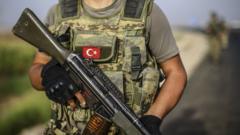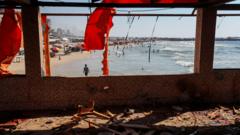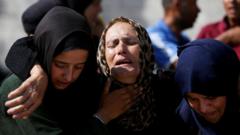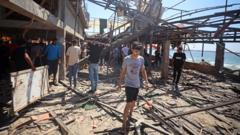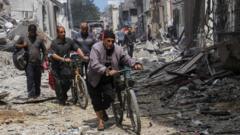In a significant development towards peace, the Kurdish PKK is set to commence a ceremonial disarmament, signaling a shift from armed conflict to democratic engagement. Turkish President Erdogan welcomes this move, which follows years of violence that led to tens of thousands of deaths. The implications for the region are profound as the PKK's imprisoned leader calls for a transition to politics, while the Turkish government prepares for parliamentary discussions on this historic moment.
Kurdish PKK Initiates Disarmament Process in Landmark Move to Resolve Longstanding Turkey Conflict

Kurdish PKK Initiates Disarmament Process in Landmark Move to Resolve Longstanding Turkey Conflict
The Kurdish PKK has begun a disarmament process, marking a potential turning point in the decades-long conflict with Turkey, as hopes for peace emerge amid security challenges.
The Kurdish PKK, after four decades of conflict with the Turkish state, is poised to embark on a disarmament process, culminating in a ceremonial handover of weapons scheduled for Friday in Iraqi Kurdistan. This initiative, celebrated by President Recep Tayyip Erdogan as a monumental shift, is expected to continue throughout the summer under rigorous security arrangements.
The disarmament ceremony will take place near Suleymaniyah, but the exact location remains undisclosed for safety concerns. The event is anticipated to draw support from members of Turkey's pro-Kurdish opposition party, the Dem party, while major opposing political factions in Turkey will likely be absent. The slow process of disarmament is set to involve cooperation among the Turkish, Iraqi, and Kurdistan regional governments.
Abdullah Ocalan, the long-imprisoned PKK leader, has vocalized support for the transition from armed struggle to democratic processes, emphasizing that the PKK’s earlier actions stemmed from a closure of political channels. This disarmament follows a series of previous failed peace attempts, the most notable being a ceasefire announced in 2013 and a subsequent failed agreement in 2015 that led to renewed violence.
The roots of the conflict trace back to the PKK's original demand for an independent Kurdish state, which evolved over the years into a call for greater autonomy for the Kurdish minority, roughly 20% of Turkey's population. The persistent violence, which has claimed approximately 40,000 lives, forced the Turkish government to subsequently exclude negotiations until the PKK disarmed.
The recent decision to disband appears heavily influenced by political dynamics, including actions taken by influential nationalists and Erdogan's encouragement to Ocalan for this shift. This call for disbandment coincides with Erdogan’s broader constitutional reform initiatives, creating speculation about potential ties between the peace process and future political maneuvers.
As the disarmament commences, the focus will transition to the Turkish parliament, where a new commission will deliberate the subsequent steps in this precarious peace process. The future circumstances surrounding Ocalan's imprisonment remain ambiguous but may see revisitation as the political landscape evolves.
With Erdogan facing declining popularity and his main competitors dealt significant political blows, the peace process serves not only as a mechanism for resolving long-standing grievances but may also benefit Erdogan’s political aspirations in the ever-turbulent realm of Turkish politics.







